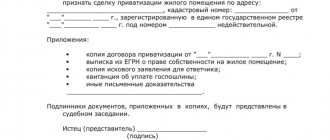Article updated: December 24, 2021
Mitrofanova SvetlanaLawyer. Work experience - 15 years
This refusal is required from a citizen who agrees to the privatization of the apartment itself, but refuses to participate in it. After refusal, he will not become one of the owners of the apartment. It is called differently everywhere - consent to non-participation in privatization or consent to privatization without participation in it. The essence does not change from this.
A small digression - if you need a free consultation, write online to the lawyer on the right or call (24 hours a day, seven days a week for all regions of the Russian Federation) Moscow and the region; 8 (812) 425-62-89 — St. Petersburg and region; all regions of the Russian Federation.
Important No. 1 : Many places on the Internet write that consent to not participate in privatization must be formalized by a notary. This is wrong. An application for refusal to participate can also be submitted in simple written form. The employee who accepts the application will certify the signature himself. You don't have to spend money on notary services. In a notarized form, a refusal is needed only when a citizen cannot submit an application in person.
The above is written in the administrative regulations for the provision of services in privatization. A notarized refusal is required in Samara and Krasnodar; their regulations clearly state this. A notarial refusal is not required in Moscow, St. Petersburg, Novosibirsk, Yekaterinburg, Kazan, Nizhny Novgorod, Ufa.
If the employee accepting the documents insists on a notarial refusal, request from him a written refusal to accept documents indicating an article of the regulations, which clearly states that only a notarial form is needed. If you have any questions about formalizing the refusal or about privatization, please leave them in the comments below. Be sure to include your city or town.
Important No. 2 : From a citizen who previously participated in the privatization of another apartment, i.e. has already spent his right, consent to privatization will be required, not refusal. Only he will no longer participate in it.
I have divided the procedure for obtaining consent for non-participation in privatization into 2 options – refusal of an adult (adult) citizen and refusal of a minor (under 18 years of age) child. I divided the options themselves into methods.
Free purchase
People who use residential premises owned either by the state or local authorities and have a residence permit can become owners of real estate for free. The basis for their residence is a social tenancy agreement.
To receive free housing, you must agree:
- family members living together who are adults;
- those who are in the age range from 14 to 18 years;
- persons who do not currently occupy living space, but have the right to do so.
The approval of only those persons who have not previously privatized another home will be required (Article 1.2 of Law No. 1541-1).
The apartment can become either the joint ownership of all tenants or one. Even a child can become the owner of a living space.
Important! In March 2021, changes were made to the law on the privatization of housing stock, making it free without a time limit.
Reasons for refusal
Russian citizens have the opportunity not only to become the owner of an apartment or room for free, but also to refuse this benefit. Usually, refusal to privatize an apartment has special reasons.
There are situations when a son lives with his parents, who are well over 80. If the apartment is registered as the property of all family members, then problems may subsequently arise with obtaining inheritance rights. And the family decides that it is most optimal for the son to receive the apartment as sole ownership.
A valid reason may also be the recognition of housing as unsafe. If a family refuses property, counting on receiving a new living space, then in the future it will be able to become its owner.
Why do we need property?
Privatization of residential premises allows a citizen to dispose of them at his own discretion. Own real estate can be rented or leased, sold, bequeathed, donated, exchanged, or made other transactions that do not contradict the law. At the same time, after privatization, a citizen acquires a number of responsibilities. In particular, the owner bears the burden of maintaining the property in full. According to the provisions of the Tax Code, he is obliged to pay tax on the area he owns. Its calculation was previously carried out in accordance with the inventory value.
However, after some amendments were made to the Code, the tax is calculated based on the market price of the property. In addition to directly privatized housing, a non-allocated share of the common property in the apartment building is transferred into ownership. In particular, we are talking about elevators, pipes, garbage chutes and other engineering equipment, walls, roofs, basements, landings, floors between floors and other objects and elements serving more than one isolated room. The costs of maintaining all this property are borne by the owners. Unlike tenants who rent housing from the municipality on preferential terms, premises owners are not guaranteed the opportunity to obtain another space in the event of losing the existing one.
Registration procedure
The refusal is attached to the documentation submitted for privatization. The list is determined by the rules established at the regional and local level. Refusal to provide free housing can be included in the text of the application for obtaining ownership of premises or in the form of a separate paper.
A notarized waiver of privatization is not always required. It is not specified in the law. But individual acts of local administrative bodies establish a rule obliging the application to be certified by a notary service. For example, you will have to contact a notary in Krasnodar or Samara. No need - in Moscow and St. Petersburg. The fee paid for the certificate is 500 rubles (Article 333.24 of the Tax Code of the Russian Federation).
Reasons
Often, the refusal of privatization is not a simple reluctance of a citizen to deal with paperwork, but his extraction of some benefit from living in a state apartment. Main reasons:
- If the apartment is not privatized and, accordingly, is not owned, then you will not have to pay real estate tax, which increases noticeably every year.
- If a building is destroyed due to an accident or natural disaster, the state will provide financial compensation for the purchase of such housing or will select suitable premises in its place. The owner will have to solve the problem on his own, especially if there is no insurance.
- The upcoming resettlement of residents of a certain house, allowing those in need to receive from the state living quarters of a larger area in accordance with the norms of square footage per person registered. If the apartment is privatized, the number of square meters will remain unchanged.
- If there is no formalized privatization of the apartment, there is no need to pay for major repairs of the entire house.
- Refusal in favor of the parent simplifies the resolution of issues with the distribution of inheritance and its transfer.
- The citizen who refused plans to privatize another premises.
- The bulk of benefits and subsidies are provided to housing tenants, not homeowners.
Not only the residents themselves can refuse to formalize privatization, but the state also has the right in some cases to prevent this. This will happen if:
- the house is recognized as unsafe;
- the apartment was issued from the place of service;
- the premises are provided by the housing fund for social protection of the population;
- housing is a dormitory;
- the house is located in a closed military town;
- During privatization, false or invalid documentation was discovered;
- the applicant does not agree to pay for the services of the registration service approved by the regulations;
- the data entered in the refusal form is invalid;
- redevelopments were carried out in the apartment that were not previously approved by the relevant authorities;
- it was revealed that a specific person had already used his right to privatization earlier in relation to another premises or part of it.
REFERENCE! Providing false documents or knowingly false data to state registration authorities may result in criminal prosecution.
Children's rights
The situation becomes more complicated when the person wishing to waive the right to privatization has children under 18 years of age. This number includes children who are adopted and taken into custody.
Is it possible to refuse privatization on behalf of children? – You can refuse to include them in the list of future owners with the permission of the guardianship and trusteeship department. This is stated in Art. 37 Civil Code of the Russian Federation, Art. 21 Law No. 48-FZ dated April 24, 2008 On guardianship and clause 7 of the Post. Plenum of the Supreme Council No. 8 of 08/24/1993. Everything that has been said is also true regarding persons of other residents who do not have legal capacity.
As practice shows, representatives of guardianship authorities almost universally refuse permission to carry out these actions. The motives are quite clear - the rights of socially vulnerable citizens are protected from infringement.
Important! When living space is occupied or has the right to be occupied by persons under 18 years of age, their inclusion in the agreement on the transfer of ownership of the premises on a free basis is mandatory (Zn No. 1541-1, Art. 7).
Where to submit documents
An application for refusal can be given to citizens who are ready to exercise their right to free housing and submit the appropriate documentation.
The entire package is addressed to the institution involved in processing the privatization of housing. Most often, this is the corresponding service related to the administration of the subject.
You need to go there with your passport in hand. The application form is issued on site, filled out and signed there. The administration employee signs the application, thereby indicating that the document was drawn up in his presence.
Typically the application includes:
- Full name of the applicant (full).
- Passport details.
- Registration.
- Reasons why the refusal occurs.
- Request to be removed from the list of owners.
In addition, you need:
- Title documents for real estate - Social tenancy agreement, move-in order, extract from the house register.
- If there are children under 18 years of age among the “refuseniks,” the decision of the guardianship authorities will be made.
These rules apply if local acts do not require a notary inscription. When you are planning to get certified by a notary, you need to go to him in person, with your passport and the specified documents.
As stated in Art. 8 of Law No. 1541-1, the decision on privatization is made within 2 months from the date of receipt of the documentation. The refusal is considered within the same time frame.
Important point
If any of the family members does not categorically agree with the privatization, then it cannot be carried out. An application for this must be made in the manner prescribed by law. In the event of the death of the main (main) tenant, the living space may again become the property of the municipality (state). In the application for refusal, the citizen, among other things, must indicate the reasons for his decision, confirm his intention and request to exclude him from the number of owners.
Consequences of failure
Refusal to receive home ownership free of charge has the following consequences:
- A person who does not want to receive housing as personal property does not lose the right to use it. He retains the right of lifelong residence if he refuses privatization. Moreover, in any development of events, for example, when he ceases to be related to members of the owner’s family (during a divorce). (Law on the introduction of the Housing Code No. 189-FZ of December 29, 2004, Art. 19).
- A difficult question is what to do when the owner changes. The answer to this can only be obtained in the process of alienation of privatized living space (sale, inheritance, signing of a deed of gift), by applying to the court. In accordance with Post. Const. Court No. 5-P dated March 24, 2015, the right of use may be preserved taking into account the specific circumstances of the case. Thus, today the problem remains open. Therefore, it is worth thinking carefully about whether abandoning privatization is really necessary.
- When a person has not exercised his privatization rights once, he may do so subsequently. And, conversely, having privatized one apartment, you cannot get another for free in the same way.
- A person who did not participate in privatization can terminate the right to live by checking out and taking part in the free acquisition of living space on the same basis.
- If you do not participate in the privatization process, the right to receive housing from the state as a person in line to improve living conditions is retained.
Is it possible to refuse privatization in favor of another person?
No. Judging by the law. Refusal to participate in privatization will not be accepted if it indicates in favor of which person the document was drawn up. Thus, it is impossible to refuse “in favor” of someone else (even from the current residents of the apartment). But you can simply write and notarize a refusal to participate in privatization, as a result of which the applicant will, as it were, transfer his share to all other participants in this procedure. It will be distributed evenly between them.
Refusal to participate in privatization and refusal to privatize: what is the difference?
Refusal to participate in privatization, which is discussed in this article, is the applicant’s actual refusal of his share of the future privatized apartment. But at the same time, all other residents literally distribute this share among themselves and can continue the procedure.
But refusal to privatize is a direct reluctance of a person not only to participate in the procedure, but to carry out privatization as such in general. In accordance with Article 2 of Law No. 1541-1, in such a situation, the remaining residents will either have to resign themselves or try to come to an agreement with the person who refuses, since otherwise privatization will become impossible.
There is also such a thing as refusal to privatize. This is already a refusal by the municipality or the state to consider the privatization application itself. Such a problem usually arises when there are compelling reasons, ranging from the premises not meeting legal requirements to the banal failure of the applicant to provide all the necessary documents.










